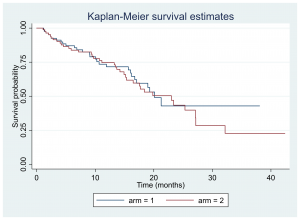
‘Time to event’ or ‘survival’ is an important endpoint used in efficacy assessments of medical interventions, particularly in disease areas such as oncology. The Cox proportional hazards (PH) model is the most commonly applied statistical model for the analysis of survival data in randomised controlled trials (RCTs). Hazard ratios (HRs) are reported from the Cox PH model as a measure of relative treatment effect. Meta-analyses of survival data are usually performed using this individual summary statistic and this approach assumes that the PH assumption holds; in other words, the relative hazards of an event are constant over time.
A major challenge encountered when conducting meta-analyses with survival data is the failure of RCT publications to report the methodology and validity of the statistical modelling approach (1). In a recent review of RCTs from five major oncology journals it was found that the use of the PH assumption to model survival outcomes is likely to have been inappropriate in many instances (1). In such cases, the estimates of relative treatment effect from the trials, expressed as HRs, and the subsequent meta-analyses which usually utilise these HRs, will be biased. This is especially problematic in network meta-analyses (NMA) where the PH assumption is imposed across multiple studies. The use of robust approaches to evidence-based medicine are vital to clinical decision-making and alternative approaches for the analysis of survival data are needed.
The non-PH acceleration failure time (AFT) model represents an alternative option to the Cox PH model when the effect of treatment is to accelerate or delay the event of interest (2). We suggest that a viable option is to independently analyse pseudo-individual patient-level data from all trials that contribute to a survival endpoint network, using both the Cox PH and AFT models. The assumptions of both modelling approaches can be assessed formally, and the most appropriate method can be used to obtain relative treatment effect estimates for use in meta-analysis.
Our evidence generation experts at Mtech have published research using this approach in what we believe is the first NMA based on trial-level acceleration factors for first-line treatments in non-small cell lung cancer (3). This approach represents a robust alternative when there is strong evidence to suggest the PH assumption does not hold in trials of a connected evidence network suitable for meta-analysis.
For further details on any aspects of evidence generation contact us at info@mtechaccess.co.uk.
References
- Batson S, Greenall G, Hudson P. Review of the Reporting of Survival Analyses within Randomised Controlled Trials and the Implications for Meta-Analysis. PloS one. 2016;11(5):e0154870.
- Patel K, Kay R, Rowell L. Comparing proportional hazards and accelerated failure time models: an application in influenza. Pharmaceutical statistics. 2006;5(3):213-24.
- Batson S, Mitchell SA, Windisch R, Damonte E, Munk VC, Reguart N. Tyrosine kinase inhibitor combination therapy in first-line treatment of non-small-cell lung cancer: systematic review and network meta-analysis. Onco Targets Ther. 2017;10:2473-82.


